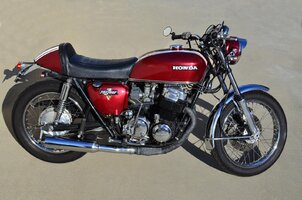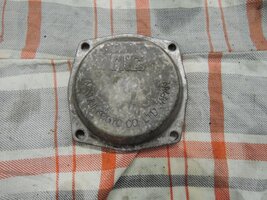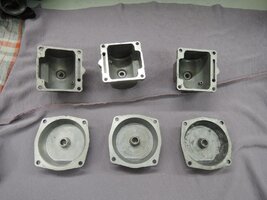Pawl
CB750 Enthusiast
One of the first thing I did when I bought my CB last summer, after I bought it, was to have a look at the carbs. The bike had been sitting in a shed for 15 years, with a 1/2 full gas tank, the throttle would not even budge, so I kinda figured that the carbs must have been gunked up . .. . I was right. . . .that black gunk all over the inside of the carbs was hard as rock too!



I have a friend who is an airplane mechanic, and he was praising the ultrasonic cleaning pretty hard, so I decided I would give it a try. He said to get one that has heating built in, so I did. I also searched for quite awhile for a deep one, 6"x6"x5.5", I bought from a company called Igem http://www.igem.com/ultrasonic-jewelry-cleaners.html The one that I bought doesn't appear to be there now (6" deep basket) as I write this? It cost $150 + $50 shipping (which sucks but a fact of life living this far north).


The first time I used it I waited . . and waited . . and waited for the fluid to heat up, so the next time I just boiled the water first. Mine has a built in thermometer and the water was about 75 degrees C. I filled the tank about a little more than half way with boiling water, and a couple big glugs of white vinegar, a couple small glugs of Spray Nine, and a couple quick squirts of dish soap (all together, the tank is about 2/3 full).
I did the carb in 2 runs of 1/2 hr. each (built in timer), after stripping the carb down, the bowl and the body go in, after 1/2 hr. all the rest of the bits go in for another 1/2 hr. As soon as it comes out I throw it in some gasoline to get rid of any water. After drying off, I hit everything with a little bit of scotch brite (takes about 1/2 hr.) but any remaining grunge is very loose.



This wiki link will explain how this really cool magic works. http://en.wikipedia.org/wiki/Ultrasonic_cleaning
If you can afford one of these machines .. . . Run out and get one!, you will not be dissapointed.
I have a friend who is an airplane mechanic, and he was praising the ultrasonic cleaning pretty hard, so I decided I would give it a try. He said to get one that has heating built in, so I did. I also searched for quite awhile for a deep one, 6"x6"x5.5", I bought from a company called Igem http://www.igem.com/ultrasonic-jewelry-cleaners.html The one that I bought doesn't appear to be there now (6" deep basket) as I write this? It cost $150 + $50 shipping (which sucks but a fact of life living this far north).
The first time I used it I waited . . and waited . . and waited for the fluid to heat up, so the next time I just boiled the water first. Mine has a built in thermometer and the water was about 75 degrees C. I filled the tank about a little more than half way with boiling water, and a couple big glugs of white vinegar, a couple small glugs of Spray Nine, and a couple quick squirts of dish soap (all together, the tank is about 2/3 full).
I did the carb in 2 runs of 1/2 hr. each (built in timer), after stripping the carb down, the bowl and the body go in, after 1/2 hr. all the rest of the bits go in for another 1/2 hr. As soon as it comes out I throw it in some gasoline to get rid of any water. After drying off, I hit everything with a little bit of scotch brite (takes about 1/2 hr.) but any remaining grunge is very loose.
This wiki link will explain how this really cool magic works. http://en.wikipedia.org/wiki/Ultrasonic_cleaning
If you can afford one of these machines .. . . Run out and get one!, you will not be dissapointed.
Attachments
Last edited:


 I'm a fan of ultrasonic cleaning as well. I've been using a solution called Sharpertek 1220 degreaser/carb cleaner and it works really well. The Sharpertek really starts to work well once the heater gets the solution up to temperature. Here's a shot of my ultrasonic cleaner. It's a 5.5 gallon unit that I bought used on ebay. These aren't the best before and after pictures but it shows how clean it got these XS400 carb bodies.. Those were straight out of the ultrasonic with no polishing or scrubbing. Most don't come out so shiny and are more of a dull gray.
I'm a fan of ultrasonic cleaning as well. I've been using a solution called Sharpertek 1220 degreaser/carb cleaner and it works really well. The Sharpertek really starts to work well once the heater gets the solution up to temperature. Here's a shot of my ultrasonic cleaner. It's a 5.5 gallon unit that I bought used on ebay. These aren't the best before and after pictures but it shows how clean it got these XS400 carb bodies.. Those were straight out of the ultrasonic with no polishing or scrubbing. Most don't come out so shiny and are more of a dull gray.
